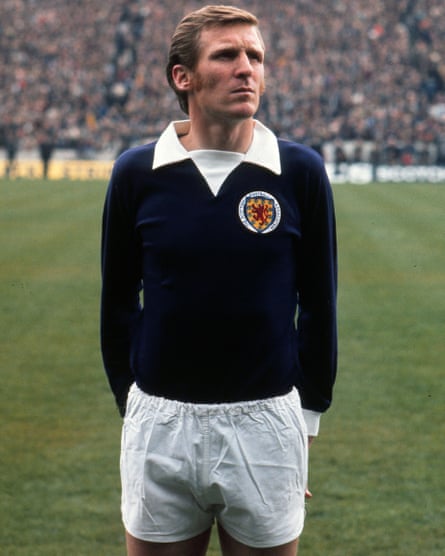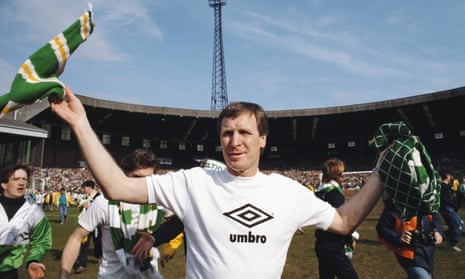Tributes have been pouring in to Billy McNeill, the first British player to lift the European Cup as captain of Celtic’s all-conquering 1967 side, who has died at the age of 79 after a battle with dementia in his later years.
In addition to making a record 822 appearances for Celtic as a player McNeill was twice manager of the club, either side of a brief spell in England, amassing a haul of 31 trophies over the course of his career. He will always be most closely associated with the Lisbon Lions’ success under Jock Stein, when Celtic not only beat Internazionale 2-1 in Portugal to become the first British team to win the European Cup, but the first ever winners of the now recognised treble.
Only seven different clubs have won the European Cup plus their domestic league and major domestic cup competition in the same season, and Celtic were not only the pioneers, they also won the Scottish League Cup in 1967 for good measure. The quadruple that Manchester City were chasing until a week ago was actually achieved half a century ago in Scotland, and there are those who will point to Celtic winning the Glasgow Cup in the same season and claim the club could boast an unprecedented quintuple.
Celtic certainly won everything in sight in the 1966-67 season, and a statue of McNeill holding the European Cup aloft has pride of place outside the stadium, yet when the centre-half first joined the club from local junior side Blantyre Victoria in 1957, trophies were few and far between. It was only the arrival of Stein in 1965 that galvanised Celtic into a winning machine, and as captain and ever-present McNeill was in a perfect position to reap the benefit.
As every member of the Lisbon Lions team was Scottish, and all but one of the side was born within 10 miles of Celtic Park (Bobby Lennox was born 30 miles away) winning the European Cup has to be regarded as one of the greatest British achievements abroad, perhaps comparable only with Brian Clough’s Nottingham Forest conquering Europe twice in a row just two years after coming up from the second division.

McNeill won most of his relatively modest total of 29 caps for Scotland early in his career, after making his debut in the infamous 9-3 defeat by England in 1961. At club level McNeill was such a doughty performer he was never once substituted – in other words he played every minute of his 822 Celtic games. With Stein in charge and McNeill as captain Celtic won nine Scottish titles in a row, in addition to seven Scottish Cups and six league cups.
On retiring as a player in 1975 McNeill initially worked with Celtic youth players before beginning his managerial career at Clyde and then Aberdeen. He was succeeded by Alex Ferguson at the latter, but might never have left in 1978 but for Stein stepping down at Celtic and recommending his former captain as the man to replace him.
McNeill’s Aberdeen had finished runners-up in the league that year, their best showing since 1972 and three places better than Celtic, but predictably he felt the call from his old club and manager too hard to turn down. McNeill’s return brought instant success, with a league title clinched with a 4-2 victory over Rangers on the final day of the season, and two others would follow in his five-year spell as manager, though by the early 80s he was disillusioned and frustrated at the way the club was being run by chairman Desmond White. Charlie Nicholas being sold to Arsenal against his wishes was apparently the last straw, though McNeill had also discovered he was being paid less than rival managers at Aberdeen, Dundee United and St Mirren.
When Manchester City came calling in 1983 he was ready to take up the challenge of managing in England, even though his new club was languishing in the second division. McNeill got them promoted in his second season in charge and managed to keep them up the following year, but 1986-87 was a struggle and he quit City early in the season to join fellow underachievers Aston Villa, thereby becoming one of the few managers to be involved with two relegated clubs in the same season.
Aptly and happily McNeill was back in Scotland in time to supervise a league and cup double in Celtic’s centenary season of 1987-88, though this was the period of Rangers domination in Scotland and the following seasons were less rewarding. He was sacked in May 1991 at the age of 51, after four years back in charge.
Rangers, like the rest of Scottish football, were quick to pay tribute once news of McNeill’s death was announced, referring to him as a “Celtic legend”. The Scottish national team said he was a true icon of Scottish football whose like would not be seen again.
The Celtic chairman, Ian Bankier, said: “This is an extremely sad day for everyone connected with Celtic Football Club, and our thoughts are with Billy’s wife, Liz, and their family. Billy’s career was incredible, and those of us lucky enough to meet and get to know him over the years came to realise that as well as a great footballer he was also a great man. His love for Celtic was evident, while his humility was always something to be admired.”
